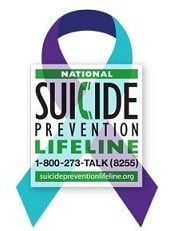It’s been estimated that approximately 38 million adults have experienced depression at some point during their lives.

Depression is an equal opportunity condition—affecting men and women of all ages, races and socioeconomic classes. And it’s also suffered by women twice as often as men.
What causes depression?
There is no single cause for depression. It springs from many facets of a person’s life: genetic history, biochemical makeup, psychosocial factors and what occurs in their day-to-day life.
Today, we have a much more educated understanding of depression than our parents’ generation—including knowing that there’s definitely hope for those who struggle with it. Treatment options include medicinal and behavioral therapies (and the synergistic combination of both).
Ways To Recognize Depression
(In Yourself Or Someone Else)
Feeling helpless and hopeless
A bleak outlook—feeling as if nothing will ever get better and that your situation won’t improve (no matter what you do).
Loss of interest in daily activities
No interest in former hobbies, pastimes, social activities or sex. Your ability to feel joy and/or pleasure is gone.
Changes in appetite and/or weight
Significant weight gain or loss (a change of more than 5% of body weight in a single month).
Sleep changes
This can either be insomnia (especially waking in the early morning hours) or oversleeping (also known as hypersomnia).
Anger and/or irritability
Feeling agitated, restless or even violent. Your tolerance level is low, your temper is short and seemingly everything—and everyone—gets on your nerves.
Loss of energy
Feeling fatigued, sluggish and physically drained. Your entire body may feel heavy, and even the smallest tasks may be exhausting or take longer to complete.
Self-loathing
Strong feelings of worthlessness or guilt. You criticize yourself harshly for perceived faults and mistakes.
Behaving recklessly
Engaging in escapist behaviors such as substance abuse, compulsive gambling, reckless driving or dangerous sports.
Concentration problems
Trouble focusing, remembering things or making decisions.
Unexplained aches and pains
An increase in physical complaints such as headaches, back pain, aching muscles and stomach pain.
Thinking that life is not worth living
If this is the case, seek professional help immediately. Do NOT wait.
Behavioral Therapy for Depression
Effective treatment for depression often includes some form of therapy—which teaches you tools to treat depression from a variety of angles. Also, what’s learned in therapy gives you insight and skills to prevent depression from reoccurring.
Some therapies teach practical techniques to reframe negative thinking and employ depression-combating behavioral skills. Therapy can also help work through the root(s) of your depression to better understand why you feel a certain way, what triggers your depression and what you can do to stay healthy.
If you (and/or or someone you care about) need help to overcome depression, please reach out to Tracy Crain.






